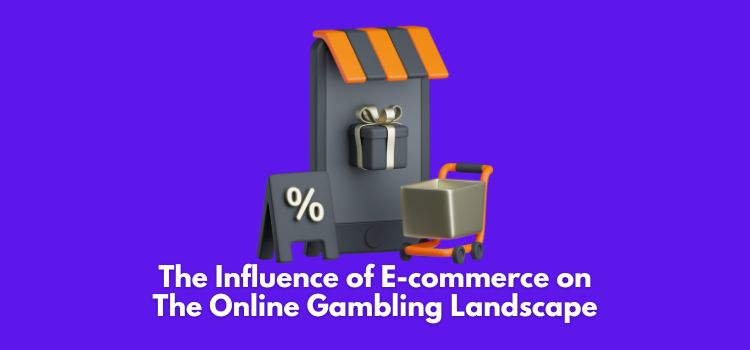The world of online gambling has undergone a transformation in recent years, thanks to the influence of e-commerce. E-commerce platforms have played an important role in shaping the online gambling industry, driving technological innovations, enhancing convenience and accessibility, contributing to legal and regulatory frameworks, and intensifying market competition.

In this article, we will take a look at the profound impact of e-commerce on the online gambling landscape and explore how it has revolutionized the way we gamble online.
➤ Innovations in Digital Gaming

E-commerce has been instrumental in improving technological advancements within the online gambling sector. One of the most notable innovations is the rise of mobile gaming. The entry of smartphones and e-commerce apps has enabled players to engage in online gambling on the go, contributing significantly to the industry’s growth.
Another innovation spurred by e-commerce is the massive game selection available to players. E-commerce platforms are renowned for displaying millions of products on their websites, each with detailed descriptions, images, and reviews to guide buyers. This feature has paved the way for online casino platforms to offer thousands of diverse online casino games.
When examining the design and layout of online casino sites and sportsbooks, the similarities with e-commerce platforms are undeniable. The user-friendly interface and extensive game libraries mirror the customer-centric approach of e-commerce.
Live dealer games have also improved due to high-speed internet and e-commerce infrastructure. These games provide an immersive casino experience by allowing players to interact with other participants and the live dealer. With live dealer games, players can watch the games unfold in real time.
Virtual Reality (VR) and Augmented Reality (AR) technologies, while not exclusive to e-commerce, have found their way into online casinos, enhancing the gaming experience. E-commerce platforms paved the way for integrating VR and AR technologies into online gambling, making it more immersive and engaging for players.
➤ Convenience and Accessibility

E-commerce has altered consumer behavior within the online gambling industry. One of the key benefits is 24/7 accessibility. Online gambling platforms are always open, aligning with the digital age’s demand for services and entertainment at one’s convenience. Whether it’s during a lunch break, while commuting, or from the comfort of their homes, users can now enjoy their favorite games whenever they please.
Also, e-commerce has enabled gambling operators to reach a global audience, expanding beyond geographical barriers and expanding their customer base. Just as e-commerce allows people to shop anywhere, regardless of their location, online gambling operators have extended their reach, giving players from every region an opportunity to enjoy their game offerings.
Payment options have also been greatly influenced by e-commerce. E-commerce introduced a wide range of payment methods, including credit cards, e-wallets, and cryptocurrencies, making it easier for users to deposit and withdraw funds securely. Online gambling operators swiftly adopted these payment options, allowing players to fund their gaming accounts and withdraw their winnings with ease.
➤ Market Competition

E-commerce has contributed to increased competition within the online gambling industry. The ease and cost-effectiveness of setting up online casinos and betting platforms have led to a surge in online gambling operators, resulting in market saturation.
With numerous new entrants and existing operators aiming for market share, competition has become fierce. This abundance of choices has placed pressure on operators to provide better odds, more enticing bonuses, and improved player experiences, ultimately benefiting the players.
➤ Affiliate Marketing

Affiliate marketing has thrived within the online gambling sector, thanks to e-commerce practices. Through various digital marketing techniques, including content marketing, social media, and search engine optimization, affiliates promote these platforms to potential players.
E-commerce platforms’ precise tracking and reporting tools enable affiliates to monitor their efforts’ effectiveness accurately. Affiliates earn commissions for each referred player who registers and plays on the platform, establishing a beneficial partnership between affiliates and operators.